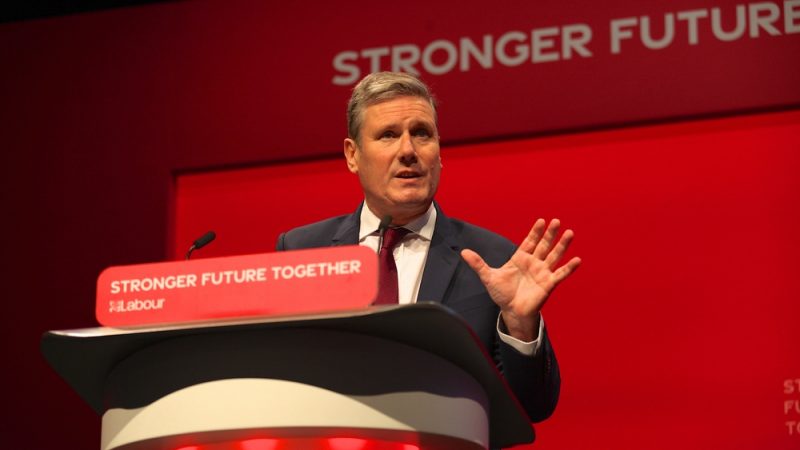
The fallout from Labour’s grim local election performance has deepened as the only Labour-held council fell to Reform late on Friday, and Prime Minister Keir Starmer appeared to take a swipe at left-wing critics in the party who spoke out over results.
In one of the final election results declared late on Friday, Labour lost control of Doncaster, shedding some 28 seats to see Reform seize power after 15 years of Labour rule.
The Prime Minister wrote an op-ed in The Times late on Friday night setting out three key priorities, hours after Doncaster’s mayor and a series of MPs on the left of the party had spoken out following Labour’s heavy seat losses and major defeats in areas from Durham to Runcorn to Cambridgeshire and Peterborough.
Doncaster’s mayor Ros Jones, who only held onto her directly elected post by around 700 votes, had said Labour needed to be ” listening to the man, woman and businesses on the street” and criticised winter fuel cuts.
READ MORE: Council by council Labour gains and losses – and its position in each mayor race
Meanwhile a string of Labour MPs on the left of the party went over the parapet to condemn the government over the results on Friday.
South Shields MP Emma Lewell issued a particularly damning statement, writing on social media that theithdrawal of winter fuel payments, denial of compensation for the WASPI women and proposed disability cuts had all “broken” the trust of voters.
She even slammed Labour’s key line from ministers responding to the elections throughout Friday, warning: “It is tone deaf to keep repeating we will move further and faster on our plan for change. What is needed is a change of plan.”
Starmer doubled down on this stance in The Times, however: “I am acutely aware that people aren’t yet feeling the benefits. That’s what they told us last night. Until they do, I will wake up every morning determined to go further and faster.”
READ MORE: Runcorn blame game begins – why did Labour lose?
He also gave a notable three-issue summary of his solution to voters’ discontent: “More money in your pocket, lower NHS waiting lists, lower immigration numbers.”
But for many in the party, Starmer’s now-familiar critique of the left will stand out most. He warned: “I’m not going to navel-gaze or turn inward.”
He wrote: “The lesson of these elections isn’t that the country needs more politicians’ promises or ideological zealotry. It isn’t that there is some easy solution, as promised by our opponents. It’s that now is the time to crank up the pace on giving people the country they are crying out for.”
Scroll to keep reading the story below….
 Starmer added: “I also know that there will be people who respond to these results by claiming that there is some simple, ideological fix. That if only we did what they say, everything would be sorted overnight. I am afraid this is wrong. Britain has tested to destruction the idea of ripping up fiscal rules or promising unfunded spending.
Starmer added: “I also know that there will be people who respond to these results by claiming that there is some simple, ideological fix. That if only we did what they say, everything would be sorted overnight. I am afraid this is wrong. Britain has tested to destruction the idea of ripping up fiscal rules or promising unfunded spending.
“Tell the families paying thousands more on their mortgages or who saw their pay packets eaten up by inflation that what we need is more recklessness with the public finances.
“Better yet, tell someone on an NHS waiting list, a parent whose child goes to a state school, a driver whose car has been damaged by potholes, a commuter waiting for their delayed train, that we should reverse the decisions we made at the budget last year to invest properly in the public services they all rely on. They will give you short shrift. No: this government’s plan for change is serious, long-term, fully funded — and is going to renew our country.”
The results have seen Labour slump to its joint worst vote share projected in over four decades, down around 150 seats. The party lost the Runcorn and Helsby by-election by a whisker, saw mayoral candidates finish fourth in Hull and East Yorkshire and third in Cambridgeshire and Peterborough, whilst suffering double-digit seat losses in once Labour-controlled County Durham, Lancashire and Northumberland.
Labour managed to hold on to the West of England, Doncaster and North Tyneside mayoralties, but only by fine margins as Reform advanced.
READ MORE: ‘Results so far say one thing: voters think change isn’t coming fast enough’
The blame game is well underway after the closest by-election in history in Runcorn, which went to a recount and saw Reform’s swing exceeding national polls – likely sparking angst among many MPs who might lose on a similar swing.
Survation warned it made up to 100 constituencies now Reform targets, Keir Starmer said Labour must go “further and faster” on current policy, while others say the cost of living is key and both left critics and defeated candidates have blamed spending cuts. Some warn against mimicking Reform as a solution, however.
In Hull and East Yorkshire, Labour’s Margaret Pinder had acknowledged voters were asking “why haven’t you fixed everything” in the lead-up, boxer Luke Campbell won the mayoralty for Reform. Pinder, who secured just 14% of the vote, said recently it would have been “slam dunk” at the general election.
In Cambridgeshire and Peterborough, won by Labour by a whisker last time, a ‘two-horse race’ message failed to stop the outgoing Labour deputy mayor ending only a fraction ahead of the Lib Dems in third, pipped by both Reform and the victorious ex-Tory MP. Nik Johnson had stood down due to ill health.
In Labour’s historic mining heartland County Durham, where it had governed for a century until 2021, won every constituency last year and was last week the largest party, the party shed a staggering 38 seats to finish fourth as Reform took control with 65 councillors.
In Lancashire, Labour-run in the New Labour era, Labour’s leader slammed spending cuts after he and 26 colleagues lost seats as Reform took control, with the Tories also losing 39 seats. In Northumberland, where Labour was the largest party in the 2000s, the party lost a dozen seats finishing a distant third behind Reform and the Tories, who narrowly remain the biggest party.
READ MORE: ‘‘Labour has lost in Runcorn – here are the eight things the party should do now‘
But the first three major sets of results fully declared early on had all seen Labour hold on, albeit with Reform finishing close second in three mayoralties.
In Doncaster, Labour’s Ros Jones was re-elected for a fourth time, but only by around 700 votes to Reform. In North Tyneside, Karen Clark held it for Labour but with only 32.4% of the vote to Reform’s 29.4%. Labour’s vote tally more than halved, however, from 33,119 for Clark’s outgoing predecessor in 2021 to just 16,230 this time round.
In the West of England, Labour’s Helen Godwin hung on despite Dan Norris’ arrest, securing a majority of less than 6,000 votes over Arron Banks, with 25% of the vote to Reform’s 22.1%, It marked an unusual four-way contest, with the Greens third on 20% and Tories on 16.6%.
Subscribe here to our daily newsletter roundup of all things Labour – and follow us on Bluesky, WhatsApp, Threads, X or Facebook.
Read more on the 2025 local elections:
Results on the day
- Council by council results: Labour gains and losses – and its position in each mayor race
- Joint worst projected national vote share projected in over four decades
- Lancashire: Defeated Labour leader hits out as two dozen seats lost
- Cambridgeshire and Peterborough: Results breakdown as Labour loses to Tories
- County Durham: Labour annihilated on once-red mining heartland
- Runcorn defeat: Results breakdown, analysis and reaction to knife-edge loss
- West of England mayor: Results unpacked as Labour edges Reform and Greens
- Doncaster mayor: Labour holds off Reform by 700 votes
- Northumberland results breakdown as Labour ends third in council it once ran
- Labour North Tyneside mayor holds on but vote halves as Reform come close
Analysis of the 2025 election results
- Starmer: ‘Labour must go further and faster to deliver after Runcorn defeat’
- Runcorn blame game begins – why did Labour lose?
- ‘Labour has lost in Runcorn – here are the eight things the party should do now‘
- MPs who could lose their seat on Runcorn by-election swing to Reform
- ‘Results so far say one thing: voters think change isn’t coming fast enough’
- Three ways to measure Labour’s success tonight
- ‘Uxbridgitis: If election results are grim, let’s not learn the wrong lessons again’
- Where’s Keir? PM barely features in Labour party election broadcasts for the locals
- The meme elections: Labour’s social media pivot to take fight to Farage
LabourList’s on-the-ground reports from the campaign
- Hull and East Yorkshire: Labour candidate spars with Reform’s boxing star in UK’s most disillusioned city
- Cambridgeshire & Peterborough Nik Johnson on why he’s standing down and Anna Smith on knife-edge Labour-Tory fight to replace him
- West of England: Tory and Green threats, Dan Norris and low voter awareness
- Lancashire: Long shadow of Gaza looms over key battleground
Inside the Runcorn campaign
- Mood on the doorstep: Labour’s last push for Tory voters to keep out Reform
- At least 150 Labour MPs visit – but Keir Starmer ain’t one
- Karen Shore interview: Labour candidate on Reform, the NHS and closing asylum hotels
- Runcorn poll: One in ten Labour voters expected to back Reform
- SHARE: If you have anything to share that we should be looking into or publishing about this story – or any other topic involving Labour– contact us (strictly anonymously if you wish) at [email protected].
- SUBSCRIBE: Sign up to LabourList’s morning email here for the best briefing on everything Labour, every weekday morning.
- DONATE: If you value our work, please chip in a few pounds a week and become one of our supporters, helping sustain and expand our coverage.
- PARTNER: If you or your organisation might be interested in partnering with us on sponsored events or projects, email [email protected].
- ADVERTISE: If your organisation would like to advertise or run sponsored pieces on LabourList‘s daily newsletter or website, contact our exclusive ad partners Total Politics at [email protected].




More from LabourList
‘AI regulation is key to Labour’s climate credibility’
Ben Cooper column: ‘Labour needs to rediscover its own authentic populism’
‘Westminster rethought: a new purpose built site and a museum of democracy’